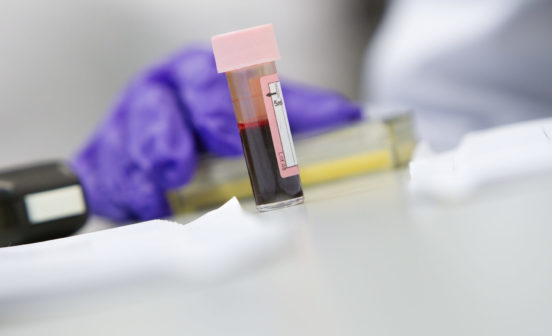This Theme is based on the hypothesis that scalable network models derived from metabolic phenotyping data will allow us to identify the molecular background of clinical phenotypes, facilitate the development of diagnostic methods for precision medicine, and help develop therapeutic interventions including targeted drug therapy and dietary interventions.
Why is this Research Needed
Both formal and informal feedback from patients and carers is that they often have a long and frustrating diagnosis journey. By being able to study at an individual chemical compound level the make-up of biofluids (blood, urine etc) and tissue biopsies it is hoped a more definitive and significantly quicker diagnosis pathways can be developed. Initially, this will look at early-stage markers for screening populations already known to be at high risk and will further develop into approaches for point-of-need biopsy assessment to speed up access to such diagnostic tools by removing the need for hospital visits and instead moving diagnosis out into the community. This is important in the northwest London population where there may be a reluctance to attend formal hospital screening visits and testing in a trusted local environment may be more conducive to engagement with early screening.
Theme Aims
- Target identification: Identification of molecular targets for diagnostic tests and drug/dietary therapy
- Diagnostic technology: Development and adoption of cutting-edge analytical methods for genomics, metabolomics and proteomics
- Data integration: Integration of multi-omics and clinical data for biochemical interpretation
- Clinical translation: Translation of diagnostic methods and drug development projects.
Upcoming /Ongoing Projects within the Theme
Multimodal multi-omics characterisation of tissues for the development of chemical pathology assays. The project is aimed at the combination of various spatial biology methods ranging from metabolic imaging through multiplex immunohistochemistry to spatial transcriptomics to create predictive network models for therapeutic and diagnostic method development. We are focusing on Alzheimer’s Disease (in collaboration with the Brain Sciences Theme) and breast cancer (in collaboration with the Surgery and Cancer Theme and the Royal Marsden/ICR BRC).
Transforming spectroscopic data into biomedical information: From signal processing to differential pathway expression analysis The project is aimed at improving the information recovery from spectroscopy datasets including primarily mass spectrometry, NMR spectrometry and infrared (incl. Raman) spectroscopic methods. The project team is developing novel spectroscopic peak-picking methods and algorithms for the chemical annotation of spectroscopic peaks and linking these molecular features to altered biochemical pathways associated with medical conditions. We are working not only with known metabolites or pathways but also actively discovering hitherto unknown molecular structures and their roles in pathobiochemistry.
Understanding the KRAS mutation-induced structural alterations in metabolic networks KRAS mutation fundamentally alters the phenotype of a number of cancers, resulting in therapy resistance and increased metastatic potential. We are developing spatial and in-situ, in-vivo spectroscopic methods for the detection of KRAS-mutant cells. The project team is pursuing a novel workflow of biomarker discovery, based on the mapping of molecular interaction networks, differential network analysis and testing of network structure robustness. The approach is expected not only to yield better diagnostic markers, but also to help identify novel therapeutic targets.
Development of extracellular vesicle-targeted metabolic and lipidomic assays for the early detection of diseases involving tissue degeneration: from neurodegeneration to cancer While a significant amount of effort has been invested into the discovery of small molecular circulatory markers (cf. blood or plasma metabolomics) for various diseases, these markers can rarely be utilised for the early detection of the disease of interest due to the extremely efficient biological control over blood composition. The project pursues an alternative approach, where circulatory extracellular vesicles produced by the target tissue are isolated and analysed for potential biomarkers.
Instantaneous biopsy analysis: histological analysis of core biopsies within minutes by laser-ablation rapid evaporative ionisation mass spectrometry (LA-REIMS) Histological analysis of core biopsy samples remains the cornerstone of pathology diagnostics. The current workflows within the NHS require 1-2 weeks from the procedure to reporting of results, causing significant anxiety to the patients and delaying interventions. The team is developing a biopsy analysis device, which examines the core subsequently after it is removed from the body and provides histological information in real-time (relative to the analysis). We are developing this device in collaboration with the Biomedical Engineering and Digestive Diseases Themes.
Patient and Public Involvement, Engagement and Participation
Acceptance of any new screening technique will only be successful if it is co-developed with the population. Public and patients will therefore be openly encouraged to participate in the development of early-stage prototypes right the way through to designing the relevant testing for final prototypes. Discussion around patient diagnosis journeys with patients will prove invaluable for ensuring the design of testing helps to reduce the frustration and risk of misdiagnosis along with identifying techniques which would prove a positive experience to encourage local populations to interact more readily with screening opportunities for early diagnosis.
Equality, Diversity and Inclusion
The Molecular Phenotyping Theme’s EDI follows the five underpinning principles of our BRC: measurable, proactive, informed, reflective and equitable. In addition to ensuring all our staff complete their EDI training, we are also committed to supporting the career development of female research staff and have strived to ensure a number of early-stage researchers are included in the Theme’s management team to act as role models for others in the College. We are also very aware that our clinical cohorts within the north west London population may have specific additional needs to increase the chances that research opportunities reach them and ensure their needs and views of research are able to be understood and discussed. This may be as simple as ensuring patient information sheets are translated into several relevent languages through to using our Community Champions to understand any other barriers to involvement in research.
Key Individuals
-
Professor Josephine Bunch
Theme Lead, Molecular Phenotyping -
Professor Zoltan Takats
Professor of Analytical Chemistry -
Dr Elena Chekmeneva
Research Associate - Structural Elucidation -
Dr Elizabeth Want
Senior Lecturer -
Dr James McKenzie
Research Associate -
Dr Rui Pinto
Research Associate in Chemometrics/Metabolomics -
Dr Zoe Hall
Senior Lecturer in Biomedical Mass Spectrometry -
Miss Lynn Maslen
Centre Manager of the MRC-NIHR National Phenome Centre -
Professor Marc-Emmanuel Dumas
Chair in Systems Medicine -
Professor Timothy Ebbels
Professor of Biomedical Data Science











